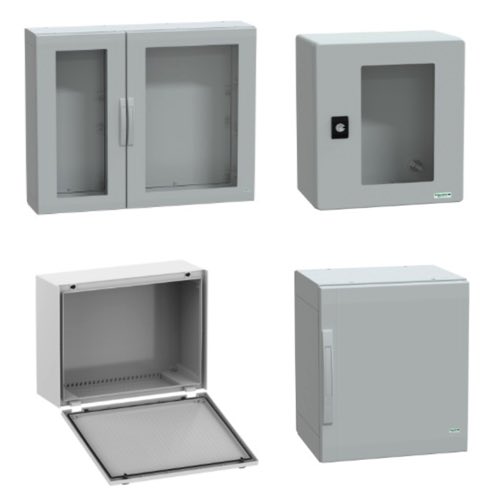Schneider Electric Polyester Enclosures

Schneider Electric polyester enclosures are engineered to protect electrical and electronic equipment in demanding industrial and outdoor environments. Available in both wall-mount and free-standing configurations, these non-metallic enclosures are constructed from fiberglass-reinforced polyester, delivering excellent mechanical strength, dimensional stability, and long-term durability.
Polyester is an inherently poor conductor of electricity, making it an effective insulating material for electrical components. This non-conductive property helps reduce electrical hazards while maintaining strong resistance to moisture, chemicals, and environmental exposure. Schneider Electric polyester enclosures are commonly used in applications where corrosion resistance and electrical insulation are critical, such as water and wastewater facilities, industrial plants, utilities, and outdoor installations.
Designed to meet recognized enclosure standards, polyester enclosures are often available with NEMA 4X and IP-rated protection, making them suitable for washdown areas and harsh environments.
FAQs
Q: What are Schneider Electric polyester enclosures used for?
They are used to house and protect electrical and electronic components in industrial, outdoor, and corrosive environments.
Q: What does an IP or IK rating mean on an enclosure?
The IP rating indicates protection against dust and water ingress, while the IK rating measures resistance to mechanical impact.
Q: Why choose polyester over metal enclosures?
Polyester enclosures offer corrosion resistance, electrical insulation, and lightweight construction while still providing strong mechanical protection.
Q: Are polyester enclosures suitable for outdoor use?
Yes. Many polyester enclosures carry NEMA 4X ratings, providing protection against rain, dust, debris, and corrosive environments.
Q: Can components be grounded to a polyester enclosure?
No. Polyester is non-conductive, so components cannot be grounded to the enclosure itself, but proper grounding methods can still be implemented within the system.
Why Buy Schneider Electric Polyester Enclosures from RSP Supply
offers a full selection of Schneider Electric polyester wall-mount and free-standing enclosures to support reliable electrical installations in harsh environments. Customers rely on RSP Supply for knowledgeable technical support and dependable access to enclosure solutions designed for durability, safety, and long-term performance.

